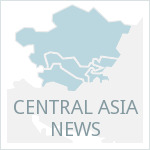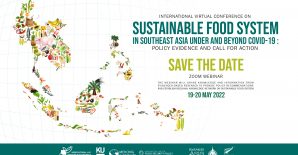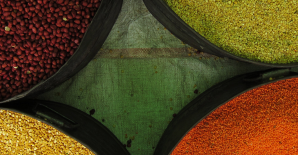News
USAID expands markets for farmers in southern Kyrgyzstan
(June 14) U.S. Ambassador to the Kyrgyz Republic Sheila Gwaltney attended the opening ceremony for a vegetable consolidation center in the southern town of Aravan. The facility – a joint project between USAID and a local entrepreneur – will sort, clean, and package around 24,000 tons of vegetables per year with the ultimate goal of supplying domestic and international retailers. – USAID
Iran leasing 10,000 hectares in Kazakhstan to save water
(June 14) Iran-based South Khorasan Agricultural Organization said that it will outsource 10,000 hectares of agricultural production to Kazakhstan to reduce demand on scarce local water resources. This is the second such deal in two years and is intended to help Iran meet its targets for grain production. Iran, which has leased around 1 million hectares overseas, expects to reach a similar arrangement in Ukraine’s Donetsk region this year. – World Grain
Korea and Central Asian countries to conduct joint study on fruit trees
(June 16) Experts from South Korea, Kazakhstan, Kyrgyzstan, Tajikistan, and Uzbekistan will conduct a collaborative research project studying trees in Central Asia’s forest areas. Central Asia is home to a number of fruit- and nut-producing tree varieties whose products are widely consumed in South Korea. Uzbek cherries already feature in Korean markets and agreements are in place to export pomegranate and melons in the near future. Uzbekistan ranks fifth in the world in terms of cherry production volume. – Yonhap News, UzDaily
Kazakhstan gets backing from ADB for more regional cooperation
(June 16) ADB Vice President Wencai Zhang is on a four-day visit to Kazakhstan, where he will take part in forums related to the Central Asia Regional Economic Cooperation (CAREC) program and Kazakhstan’s economic development agenda. The ADB has directed more than $10 billion through CAREC, which consists of 11 Eurasian countries and seeks to promote economic growth through greater trade and integration. – UPI, ADB
New unified tariff expected to increase Kazakh-Kyrgyz railway cargo transport
(June 19) The lower house of the Kazakh parliament approved the ratification of an agreement between Kazakhstan and Kyrgyzstan that would allow Kyrgyz transporters to move their goods through Eurasian Economic Union countries under a unified tariff regime. The move is expected to increase the volume of trade on Kazakhstan’s railway systems and reduce costs for importers and exporters. – Astana Times
IMF: Turkmenistan economic outlook mixed, reforms must continue
(June 19) An IMF delegation concluded annual bilateral discussions with Turkmen officials, offering a mixed outlook on the economy. Turkmenistan can expect continued growth and moderate inflation over the next several years but also faces external pressures because of large external deficits and high levels of public investment, according to the press statement. While IMF executive directors signaled guarded support for Turkmenistan’s current fixed exchange rate regime, they advised that greater flexibility would help the country address its medium-term challenges. Moreover, they underscored the economy’s heavy dependence on the hydrocarbon sector and urged further reforms, including lessening the state’s role in planning and coordinating economic activity. – IMF
Analysis & Other Information
World Bank: only 17 percent of Tajikistan's population uses Internet regularly
(June 13) The World Bank presented its report on Internet and technology use in the Europe and Central Asia (ECA) region at a conference in Dushanbe on June 13. According to the report, Internet usage is very low in Central Asia – ranging from 12 percent in Turkmenistan to 55 percent in Kazakhstan. In Tajikistan, where only 17 percent of the population reports using Internet regularly, dial-up remains the primary mode of access outside of urban areas. Central Asia faces myriad challenges in terms of Internet connectivity, not the least of which are the high costs of wiring a large region with unfavorable terrain and relatively low population density. – Asia Plus, World Bank
Energy in Central Asia: Who has what?
(June 15) The three energy-rich countries of Central Asia – Kazakhstan, Turkmenistan, and Uzbekistan – have been buffeted by global developments in oil and gas since 2014. This article briefly describes energy production in the three countries and largely derives its information from British Petroleum’s annual flagship report. – The Diplomat, BP
Inside the world's largest walnut forest
(June 15) This international travelogue takes a look at the world’s largest natural walnut forest located near Arslanbob village in central Jalalabad province in Kyrgyzstan. – Roads and Kingdoms
Interpreters witness booming border trade between China and Kazakhstan
(June 15) Chinese state news agency Xinhua provides a brief snapshot of two Kazakh citizens working at jobs related to the cross-border trade at Khorgos, a city on the Kazakhstan-China border that serves as the main land crossing between the two countries. – Xinhua
Central Asia: All together now
(June 16) Regional associations like ASEAN and the Nordic Council can serve as useful models for a Central Asian analogue in the future, according to this essay published in The American Interest. It details some of the recent diplomatic progress in the region (including Afghanistan in its scope) and imagines some challenges a more cohesive Central Asia could face, especially from outside powers. – The American Interest
Desertification monitoring in Turkmenistan
(June 17) In a feature that appears on Turkmenistan’s state newspaper Altyn Asyr, Aman Babaev, head scientist at the National Institute of Desert, Flora, and Fauna under the State Committee for Natural Protection and Land Resources, describes how his institute contributes to national strategies on desertification. Babaev commented on the institute’s use of information technology and its interactions with a variety of public and private stakeholders. Approximately 80 percent of Turkmenistan is desert. – Altyn Asyr Turkmenistan
Publications & Reports
Asia's glaciers are a regionally important buffer against drought
Pritchard, H. Nature. May 2017. Volume 545, Issue 7653, pp 169-174.
Eurasian economic integration (2017)
Eurasian Development Bank Centre for Integration Studies. June 2017. Report 43.
Overview of agricultural trade policy in the post-Soviet states 2015-16 (in Russian)
FAO. 2017.
Drought characterization and management in Central Asia region and Turkey
FAO. 2017.
Reaping digital dividends: Leveraging the Internet for development in Europe and Central Asia
Kelly, T., Liaplina, A., Tan, S., Winkler, H. World Bank. June 2017.
Review of energy-growth nexus: A panel analysis for ten Eurasian oil exporting countries
Hasanov, F., Bulut, C., Suleymanov, E. Renewable and Sustainable Energy Reviews. June 2017. Volume 73, pp 369-386.
Total factor productivity convergence across the Kazakh regions
Turganbaev, Y. Post-Communist Economies. June 2017. Volume 29, Issue 2, pp 182-197.
Events & Calls for Papers
Eurasian Food Economy Between Globalization and Geopolitics
Conference. June 21-23 in Halle, Germany. Organized by the Leibniz Institute of Agricultural Development in Transition Economies (IAMO) with support from the Food and Agriculture Organization of the UN (FAO) and Committee on Eastern European Economic Relations (OA). Deadline to register is May 31, early-bird registration closes on May 1.
Life in Kyrgyzstan
Annual Conference. October 12-13, 2017 in Bishkek, Kyrgyzstan. Organized by Institute of Public Policy and Administration of the University of Central Asia (UCA), Stockholm International Peace Research Institute (SIPRI), Leibniz Institute of Vegetable and Ornamental Crops (IGZ), International Food Policy Research Institute (IFPRI), International Security and Development Center (ISDC), and the Food and Agriculture Organization of the United Nations (FAO). Deadline to submit papers is June 15, 2017. Deadline to register is September 15, 2017.
Archived issues of the news digest can be found on the Central Asia page under the ReSAKSS Asia website: http://resakss-asia.org/regions/central-asia. A link to the newsletter can be found under Blog Posts.
The articles included in this news digest have been generated from online sources. Any opinions stated herein are not representative of, or endorsed by, the International Food Policy Research Institute or its partners.



